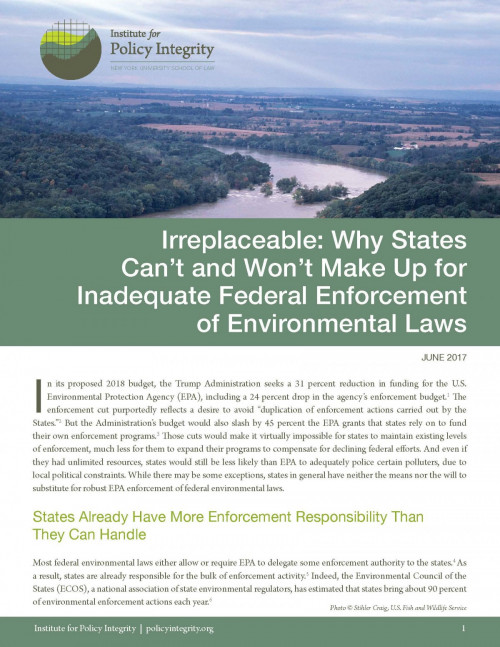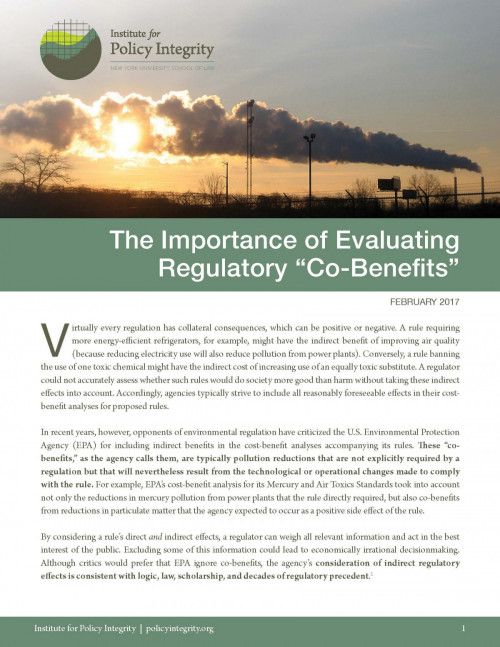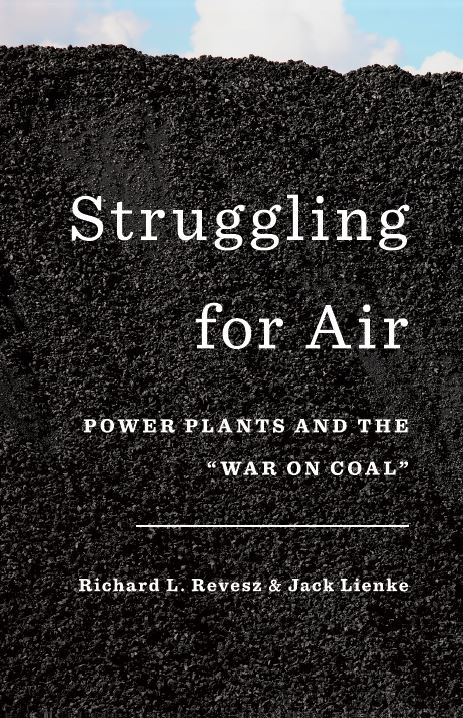-
Comments on EPA’s Proposal to Issue a Second Stay of the Effluent Rule
Policy Integrity has filed comments opposing EPA’s proposal to issue a second stay of the compliance deadlines in the Effluent Rule—a rule that regulates toxic metal discharges from power plants. As we explained in our comments to EPA, EPA has no legal authority for the proposed stay. In addition, EPA failed to provide a reasoned explanation for the stay because it ignored the impact that the stay will have on the benefits of the Effluent Rule.
-
Challenging EPA’s Effluent Rule Suspension
EPA has suspended the compliance deadlines in a regulation on power plant wastewater discharges, which limits plants from releasing certain toxic metals into lakes and rivers. We submitted a “friend of the court” brief in the legal challenge to the suspension. Our brief argues that the decision to suspend the rule was arbitrary and capricious because EPA focused only on amorphous compliance costs and ignored the effects of pollution that will continue to be discharged while the rule is suspended. As we explain in the brief, it is fundamentally irrational to make a decision based on such a one-sided analysis, and the suspension should be vacated.
-

Irreplaceable: Why States Can’t Make Up for Inadequate Federal Enforcement of Environmental Laws
Budget cuts threaten EPA’s ability to enforce federal environmental laws, and states have neither the means nor the will to substitute for it. Our issue brief on EPA enforcement explores the financial and political constraints that state regulators already face when implementing federal environmental laws and how the Trump Administration’s budget cuts would exacerbate these problems.
-
Comments on EPA’s Proposal to Further Delay the Amendments to the Risk Management Program
We recently submitted comments on the Environmental Protection Agency’s proposal to delay the effective date of EPA’s amendments to the Risk Management Program for twenty more months and to put off the compliance deadlines indefinitely. The original rule was issued under section 112®(7)(A) of the Clean Air Act and updated chemical accident prevention rules at manufacturing plants, after a fatal explosion at a fertilizer plant in West Texas.
-
Toxic Substances Control Act Comments
We recently submitted two sets of comments to the Environmental Protection Agency (EPA) on issues related to the implementation of the recently amended Toxic Substances Control Act (TSCA). The first comment letter focuses on EPA’s proposed restrictions on the manufacture, processing, and distribution of trichloroethylene (TCE) for use in aerosol degreasing and in spot cleaning in dry cleaning facilities. Our second comment letter focuses on EPA’s proposed process for conducting future risk evaluations under the amended TSCA.
-

The Importance of Evaluating Regulatory “Co-Benefits”
Our issue brief on Regulatory Co-Benefits analyzes the importance of using unbiased economic analysis to consider all direct and indirect costs and benefits of any environmental safeguard.
-
Policy Integrity Files Brief in Case Challenging EPA’s Mercury and Air Toxics Standards
In 2012, EPA issued the Mercury and Air Toxics Standards (MATS), which limit coal- and oil-fired power plants’ emissions of mercury and other hazardous air pollutants. In their most recent challenge to the rule, Petitioners seek to obscure the fact that regulating power plants’ emissions of hazardous air pollutants overwhelmingly benefits society by asking the U.S. Court of Appeals for the D.C. Circuit to ignore or discount large portions of EPA’s analysis—namely, its consideration of indirect benefits (sometimes called ancillary benefits or co-benefits) and unquantified benefits. But, as our amicus brief points out, EPA’s consideration of indirect benefits and unquantified direct benefits is consistent with the Clean Air Act, past court decisions, federal cost-benefit guidelines, economic best practices, and regulatory precedent. Overall, we argue that the agency’s cost-benefit analysis was properly conducted and more than satisfies its obligation to consider costs when determining whether regulation of power plants’ hazardous emissions is “appropriate and necessary.”
-
Brief for Challenge to Ozone Standard
The U.S. Court of Appeals for the D.C. Circuit will soon hear arguments in Murray Energy Corp. v. U.S. E.P.A., challenging the EPA’s revised ozone National Ambient Air Quality Standards (NAAQS). Policy Integrity has submitted an amicus brief in support of the EPA for this case.
-
Comments on Supplemental Finding for EPA Mercury Rule
After the Supreme Court ruled that the EPA did not consider costs at the appropriate stage of its regulatory process when crafting the Mercury and Air Toxics Standards, the EPA was tasked with revising the rule. The agency recently released a supplemental finding that it is appropriate and necessary to regulate hazardous air pollutants from coal- and oil-fired electric utility steam generating units, taking the costs of regulation into account. We submitted comments to the agency.
-
Struggling for Air
Power Plants and the “War on Coal”
Since the beginning of the Obama Administration, conservative politicians have railed against the President’s “War on Coal.” As evidence of this supposed siege, they point to a series of rules issued by the Environmental Protection Agency that aim to slash air pollution from the nation’s power sector. Because coal produces far more pollution than any other major energy source, these rules are expected to further reduce its already shrinking share of the electricity market in favor of cleaner options like natural gas and solar power. But the EPA’s policies are hardly the “unprecedented regulatory assault” that opponents make them out to be. Instead, they are merely the latest chapter in a multi-decade struggle to overcome a tragic flaw in our nation’s most important environmental law.
Viewing recent projects in Environmental Health

